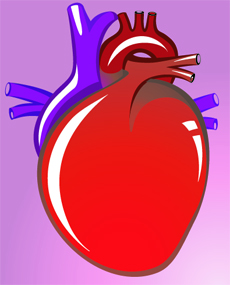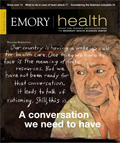For a heart attack in Atlanta, take me to Emory

You don't feel like yourself. There's an uncomfortable pressure in your chest, a tingle down your left arm, and you just can’t seem to get your breath.
Would you know you were having a heart attack? And if so, would you know what to do?
Start by calling 9-1-1, says Kate Heilpern, chair of Emergency Medicine at Emory. “Seconds and minutes absolutely matter, and by recognizing the signals of a heart attack and calling 9-1-1, you will have a fighting chance to get yourself or a loved one to a center able to handle such emergencies.”
And if you live in Atlanta, when EMS arrives, ask them to take you to Emory. Why? Emory University Hospital and EUH Midtown are the only chest pain centers in the metro area to be accredited for angioplasty by the Society of Chest Pain Centers (SCPC).
The designation indicates a higher level of emergency cardiac services. (Coronary angioplasty is a procedure to treat narrowed arteries of the heart. During the procedure, a balloon is used to open a blockage in a coronary artery, improving blood flow to the heart.)
A goal of the SCPC is to reduce mortality from heart attack (about 600,000 Americans die of heart disease annually).
The society is teaching the public to recognize and react to early symptoms of a possible heart attack, reducing the time it takes to receive treatment, and increasing accuracy and effectiveness of treatment.
According to a study by Emory emergency medicine doctor Michael Ross in the American Journal of Cardiology (July 2008), accredited hospitals performed better in heart attack core measures established by the Centers for Medicare and Medicaid Services than nonaccredited hospitals. If all hospitals performed core measures at levels reported by accredited chest pain centers, more heart attack patients would be treated with aspirin and beta blockers, Ross says. That “might lead to more heart attack patients receiving emergency angioplasty within 120 minutes—the so-called ‘door to balloon’ benchmark.”
At Emory, the chain of survival from the 9-1-1 call to the ER to the cath lab is available 24/7. “When EMS suspects a heart attack, getting the patient to the right place at the right time with the right providers to do the right thing definitely optimizes patient care and enhances quality and outcome,” says Heilpern.
Emory participates in the Metro Atlanta Cardiology Consortium’s TIME (timely intervention for myocardial emergencies) program, which has developed a rapid response to cardiac emergency by improving every step of care. As a part of TIME, full 12-lead EKG units are in all the ambulances that respond to 9-1-1 calls in Fulton County. They are able to transmit the EKG to participating hospitals, where a physician reads the EKG and activates the emergency cath team even before the patient arrives, shortening time between onset of the heart attack and the opening of the artery.
You may be having a heart attack if you experience:
How do chest pain centers receive accreditation?
|
||


